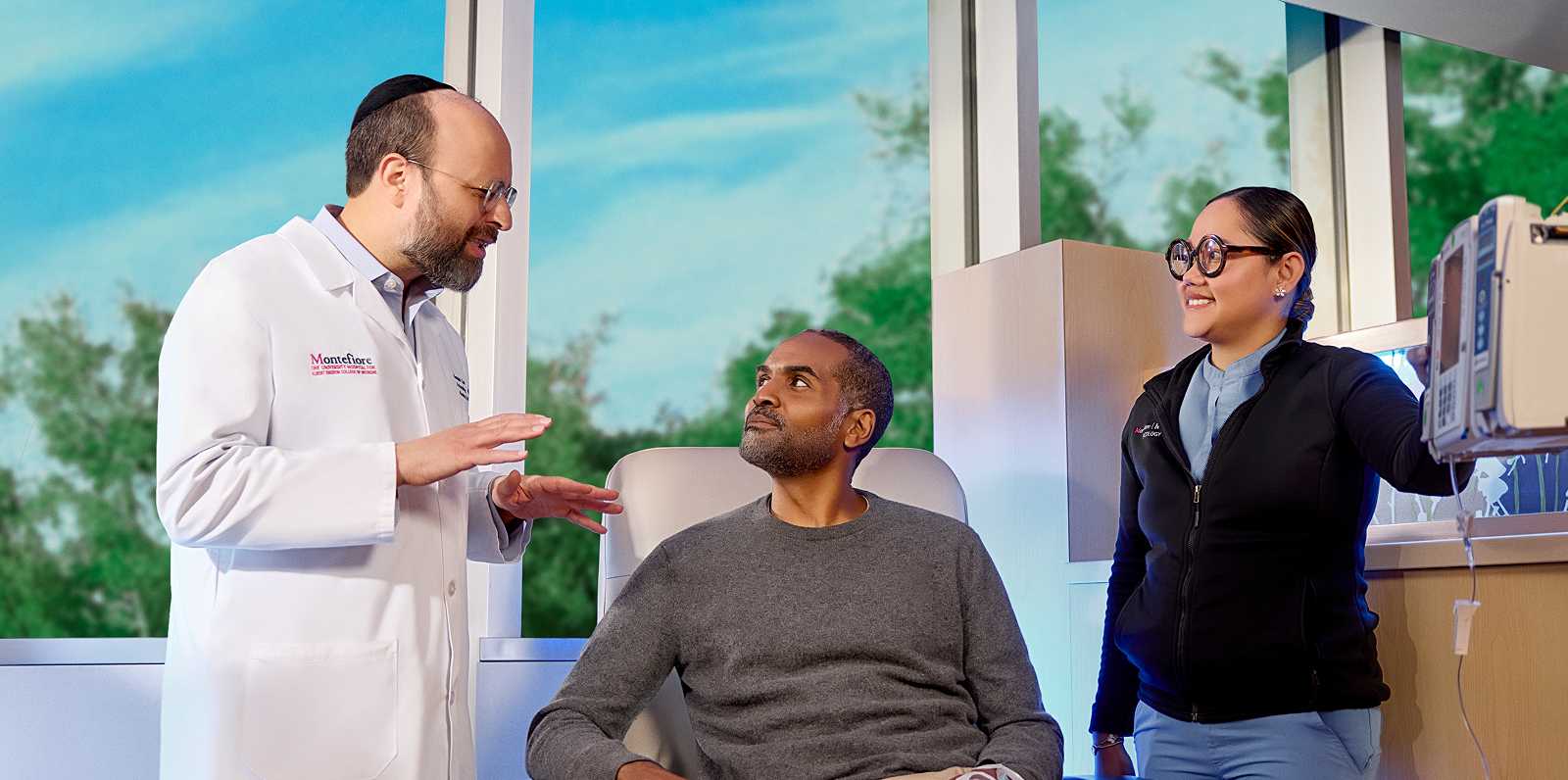HIGHLIGHTS
Montefiore Einstein Researchers are Optimizing Care for Blood Cancers by Reducing Toxicity with Metronomic Dosing
Researchers at Montefiore Einstein Comprehensive Cancer Center have made progress in optimizing the drug regimen for myelodysplastic syndromes (MDS, a precursor to leukemia) and acute myeloid leukemia (AML) by introducing a protocol that is just as effective—but less toxic and better tolerated—than the standard approach.
The “metronomic dosing” regimen they developed involves patients with MDS and AML taking much lower weekly doses (microdoses) of the standard drug combination rather than receiving larger doses monthly. These blood cancers are more common in older adults, a population that also tends to experience more treatment side effects. Metronomic dosing helps ensure that patients get the benefit from treatment with the fewest side effects, which can frequently be severe and result in the development of other potentially serious health conditions or the need to discontinue treatment.
Mission: Optimization
The current standard of care for MDS and AML in elderly patients who cannot tolerate intensive chemotherapy is a combination of the chemotherapy drug decitabine and a targeted agent called venetoclax. Patients who received both drugs in a VIALE-A clinical trial (published in the New England Journal of Medicine in 2020) had much better outcomes than those who received decitabine alone. “But that study didn’t ask the question, “What’s the best way to give these drugs?” said Mendel Goldfinger, MD, Clinical Program Director, Hematologic Malignancies, Montefiore Einstein Comprehensive Cancer Center, and Associate Professor, Oncology (Medical Oncology) and Medicine (Oncology & Hematology), Albert Einstein College of Medicine.
In a study recently published in the journal Blood, Dr. Goldfinger and colleagues from Montefiore Einstein Comprehensive Cancer Center and the Albert Einstein College of Medicine along with two from other institutions, explored a protocol aligns with the U.S. Food and Drug Administration’s Oncology Center of Excellence Project Optimus, an initiative aimed at redesigning cancer therapies to optimize drugs’ effectiveness, safety and tolerability.
“Our study shows that patients receiving lower doses of these drugs have less toxicity, less need for blood transfusions, fewer days in the hospital and fewer infections—without compromising the effectiveness of the drug regimen,” Dr. Goldfinger said.
Toxicity in Blood Cancer Treatment
In MDS and AML, cancer spreads through the process of hematopoiesis, the bone marrow’s production of red and white blood cells and platelets. But the toxicity of the drugs that kill the cancer cells also interrupts the normal blood cell production process, which can cause serious side effects, including anemia (from low red cell count), impaired immune function (from low white cell activity) and hemorrhages (from low platelet production).
Typically, patients receiving standard, high dose decitabine and venetoclax require reductions in dose and interruptions or treatment delays to allow their healthy cell counts to recover. In some cases, the drugs’ toxicity leads to fatal complications from low blood cell counts—even though the patients are technically in remission from the cancer being treated.
A Patient-Centered Approach to Dosing
The new, prospective study led by Dr. Goldfinger and colleagues shows that much lower, gradual dosing of decitabine and venetoclax is just as effective at treating these cancers, while causing less damage to the body’s healthy cells.
Instead of the usual therapy (decitabine and venetoclax given concurrently, with both drugs for the first five days and venetoclax continuing for at least 21 days), Dr. Goldfinger’s metronomic dosing approach used much lower doses of each drug. The medicines were given weekly. Of the 31 patients studied, 90% were able to receive therapy without interruption or dose reductions. Cancer outcomes were very similar to the high-dose standard of care.
Dr. Goldfinger sees the potential for adding a third cancer-fighting agent to the mix. “Every trial that’s trying to add a third agent is struggling because the ‘backbone’ combination therapy is already so toxic that patients can’t handle a third drug. But at these lower doses, our backbone has room for a third agent because we have reduced the toxicity,” he said. “We’re will soon start to enroll patients in a new trial to prove that another agent can be added safely. So, this new metronomic dosing schedule is really primed to become something that we can continue to build on.”
Patient referrals
At Montefiore Einstein Comprehensive Cancer Center, we know that providing patients with the best possible oncology care includes teamwork and trust. We work closely with our valued referring physicians to ensure open communication and reliable expertise.
Contact us
Anne McDarby
Associate Director, Network Program Management
Montefiore Einstein Comprehensive Cancer Center
1-718-862-8840 /ext. 5034
amcdarby@montefiore.org
Andrea Peirce
Assistant Director, Communications
Montefiore Einstein Comprehensive Cancer Center
andrea.peirce@einsteinmed.edu


